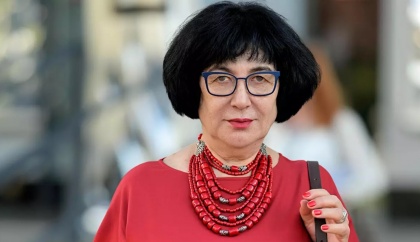
Ten years ago, following the Revolution of Dignity and at the outbreak of Russia's war against Ukraine, the first Docudays UA film clubs opened in Ukraine. They were moderated by opinion leaders who formed a community of people interested in documentary cinema and wanted to change life in their communities for the better.
Currently, the Docu/Club Network comprises 450 film clubs that engage over 40 thousand viewers every year. What is the power of film clubs' influence on communities? How does the network support grassroots initiatives and help residents of cities and villages achieve positive changes in their communities? How do film clubs influence the formation of civil society through documentary films? Alla Tiutiunnyk, Director of the Network Development Department at the NGO Docudays, tells about all this in an exclusive interview with Detector Media.
- How and when did you come up with the idea to create documentary film clubs?
- The idea of film clubs was conceived by the festival's founder and director Hennadiy Kofman. Many years ago, he said that documentaries have virtually no distribution, they are not screened in cinemas, and it’s impossible to watch them on television. Thus, people don't know what a real documentary is.
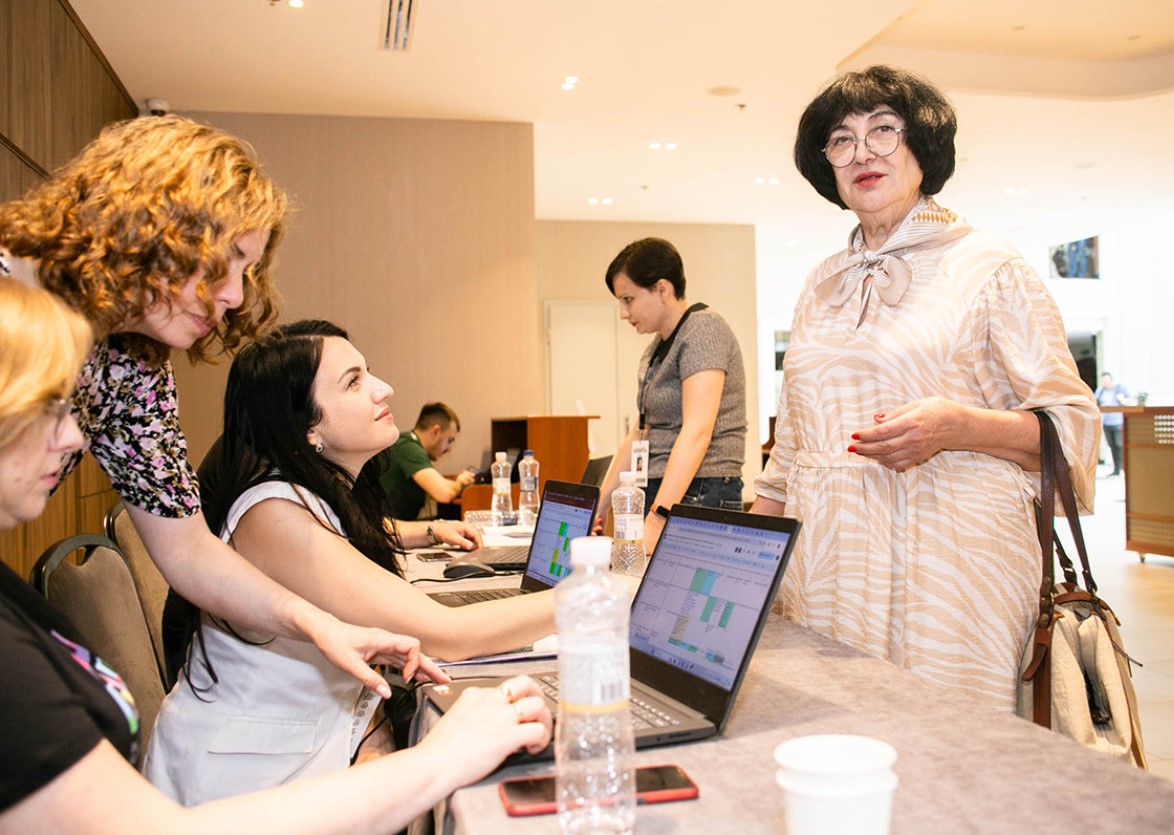
With the Docu/Club Network Team
In 2014, during the Revolution of Dignity, this idea was developed further, and a part of society has matured. We were screening films on the Maidan. People would recognize members of the festival team, approach us, and ask where they could watch the films. Subsequently, these same people would ask whether there would be the March festival, which was supposed to start on March 21. The Revolution of Dignity had prevailed, and our filmmakers managed to edit the film “Euromaidan. Rough Cut” about revolutionary events. We opened the festival with it.
For me, March 21, 2014 was an exciting and inspired day. After the festival started, Hennadiy and I spent an hour telling each other about all our dreams for film clubs. In June, we started to make our dreams come true. This is why we celebrate the birthday of our Docu/Club Network in June. In 2014, 47 film clubs opened by the end of the year, and in 2015 we had 75 film clubs. We’d already had 30 films in our film library and discussion scripts for our moderators. Currently, there are 450 film clubs, and 130 documentaries from different countries have been translated and dubbed into Ukrainian.
- How revolutionary was this idea ten years ago, and how did society react to it?
- In the capital, some of the festival’s viewers knew what real documentary cinema was. In other big cities, one could watch documentaries at the Traveling Festival. But outside of the Kyiv festival and the Traveling Festival, people had a perception of documentaries as some sort of propaganda, popular science, or advertising. Film clubs, although not as fast as we wanted, began to change this perception and form a taste for real documentary films and their discussions, inspiring viewers to learn more about the world, human rights, mechanisms for protecting these rights and their practical application.
For our team, these first years were a period of intensive learning. For example, how to protect ourselves from various politicians’ attempts to use our film clubs to advertise their party? How to ensure guaranteed copyright compliance in the work of film clubs? It turned out that creating a network of film clubs requires a lot of bureaucratic work: development of regulations, policies, and rules, a code of ethics, reports from film clubs, a monitoring system, as well as a system for training moderators and providing them with methodological materials.
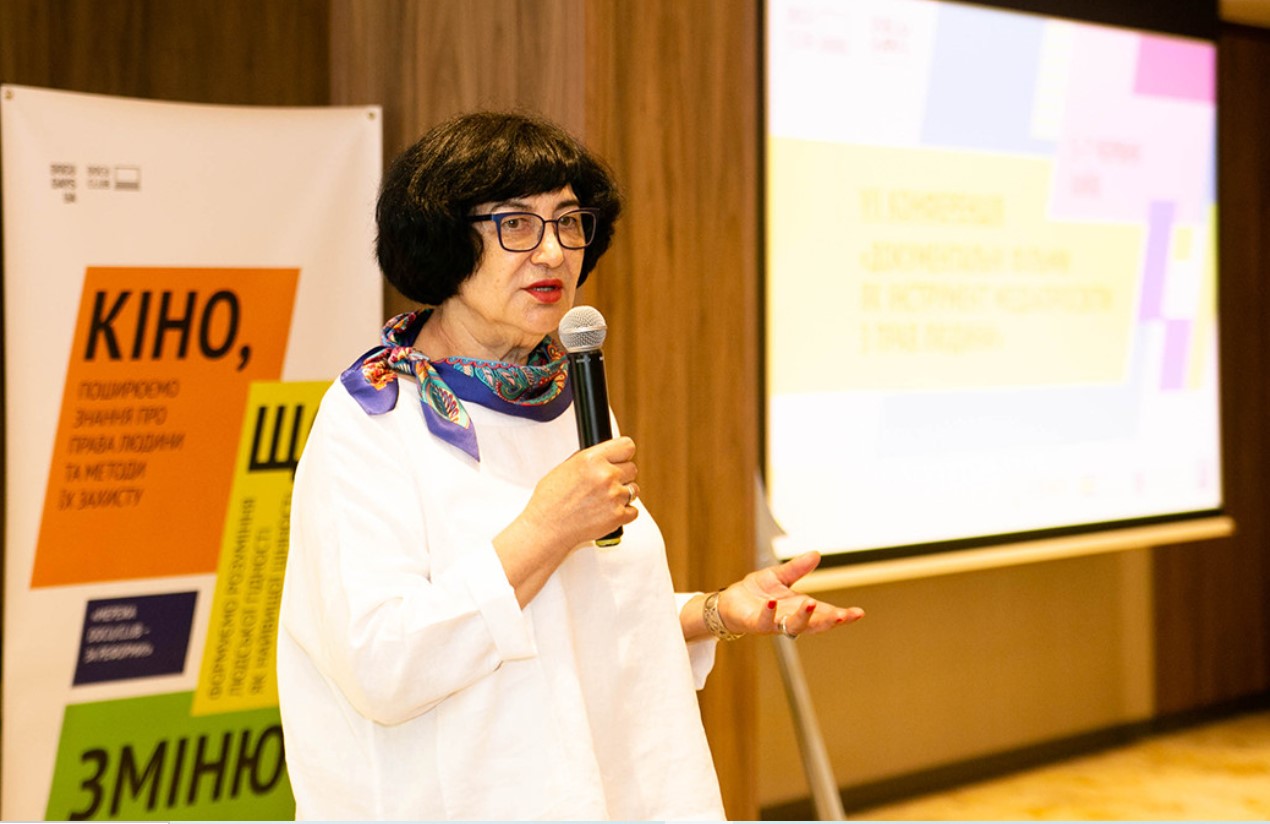
Alla Tiutiunnyk
It was only in 2016-2017 that we realized for ourselves what a magical, uncanny thing documentary cinema is and how it changes communities. At film clubs, people watch stories that happened in reality, relate them to their own experience, and realize that everything is possible.
People who opened film clubs in small towns or even villages began to realize that the world is much bigger, more diverse, wider and more complex than it might seem when you live in one place all your life.
There were heated discussions, and sometimes the audience did not accept a director's position. There was already a war going on in Donbas, and it happened that provocateurs came to our film clubs in the Luhansk region, saying “we are brothers” and “what's the difference.”
In Kremenchuk, representatives of the ultras tried to disrupt the screening of a film in which the author, in their opinion, was uncritical towards separatists who came to power in Donetsk. The moderator managed to convince them that this technique of seeming impartiality made the separatists in the film look like vile moral monsters. Some of the ultras left, while others stayed to watch the film and took part in the discussion quite peacefully.
At the beginning, there were many heated discussions about the LGBT+ community. We had several films on this topic. Sometimes, discussions in film clubs would turn very emotional and even aggressive. Nowadays, there is way less aggression than there was ten years ago. Because documentaries influence the worldview through feelings. Not through logic and reasoning, but through feelings and empathy.
You watch a film and begin to realize that there is a lot in the world that you don't understand, that people in this world are different, but they are all human beings. They love, suffer and rejoice just like you. They live and work next to you. And they have the same rights as you. Understanding and empathy are being formed on the level of feelings. This is the magic of documentary cinema.
It is also inspirational. If you watch a film about a strong and determined person who successfully defends his or her rights and the rights of his or her community, you will also want to make changes in your community.
- How did you come up with the idea of conducting advocacy campaigns in film clubs?
- It was not us, but the communities in film clubs who came up with this idea. Ten years ago, we could not even imagine that our film clubs would eventually become ready for advocacy campaigns. However, in two or three years, in some of the film clubs’ reports, we saw wonderful impact stories and even the first attempts to unite and influence the decisions of local authorities. Later, we created the Advocacy School for the entire Docu/Club Network and started conducting competitions for advocacy campaign projects. We selected the most developed projects and helped implement them. As of today, the film club communities have already conducted 80 successful campaigns, and 15 more are in the process of being implemented.
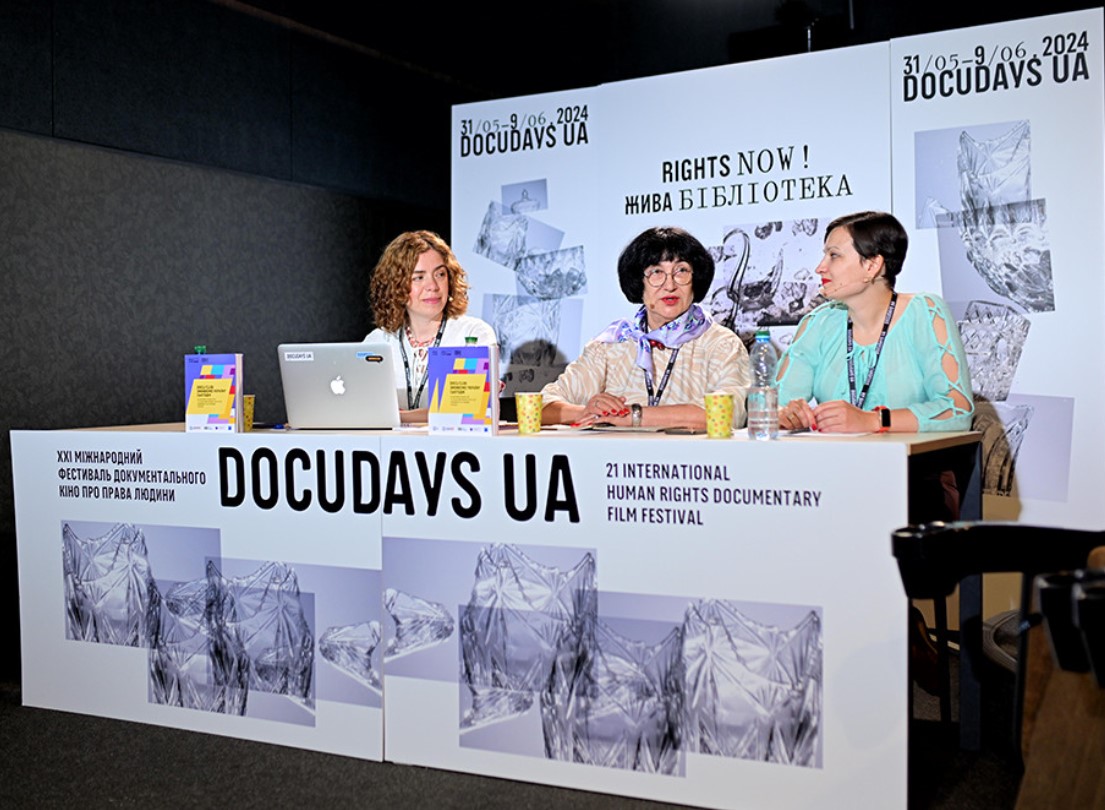
Part of the Docu/Club team during the festival
- Sometimes people say that documentary films are difficult to perceive because they make people think instead of entertaining them. Do you think that a person requires preparation to watch documentaries, or can anyone watch them?
- Anyone who likes to think and wants to learn to think can watch documentaries, regardless of their age. For example, three years ago, my granddaughter, who was 7 years old at the time, was very much into computer games. I showed her the documentary “Web Junkie” by Shosh Shlam and Hilla Medalia.
The film dives into the life of a rehabilitation center in Beijing and explores the cases of three Chinese teenagers who are addicted to Internet games, and whose passion for gaming has led to loss of human feelings, connections with their parents, and a sense of reality in general. The plot explores different states of the addicted teenagers from the day they arrive at the rehabilitation center, through the three months of treatment there, and until they return home.
My granddaughter still remembers the film well. It made an impression on her - not verbal instructions and warnings from adults, but a film based on real events. This helps her be more cautious about online games. In general, she likes to watch documentaries, and I like to discuss them with her, because this way I learn a lot about her inner world and about the preferences and views of her peers.
Middle-aged and older children like to watch and discuss documentary films at Docudays UA school film clubs. Once a year, we organize Docu/Week in some 300-400 schools, with participation of teachers, children, and parents.
- Generally speaking, what role does human rights documentary film play in society?
- We call it “letting the genie out of the bottle.” Documentary films let genies out of bottles - some viewers grow wings, become brave, strong, and make miracles happen. Most people live according to stereotypes, rules, and restrictions imposed by school, parents, environment, and fear: “What will people say?”
Documentaries open the whole world to people and teach them freedom. They inspire initiative, the desire to act. Many energetic and talented people simply don't know how to achieve self-realization: they sit in a corner and grumble that everything is “wrong” around them, but they don't dare to do anything to make it right. When they watch documentaries and see other people who are brave and active, they start wondering about similar scenarios for themselves. They gain the desire and courage to make an impact on life and improve it.
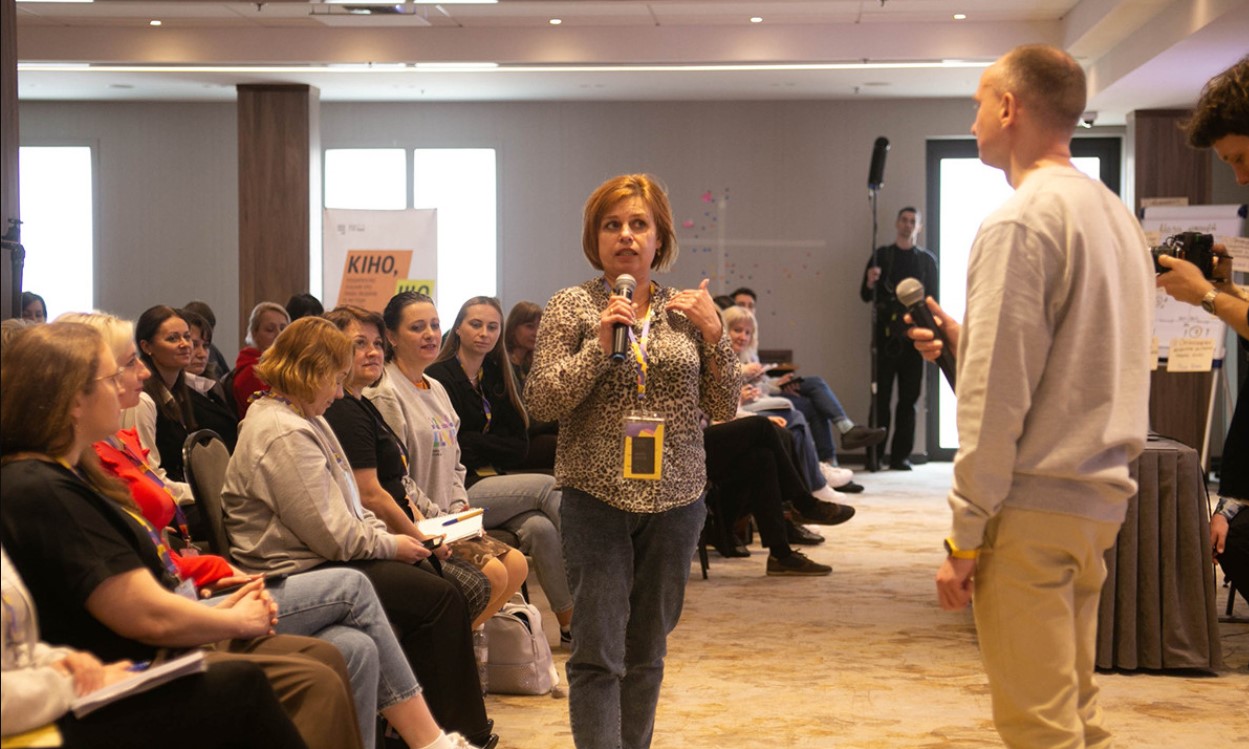
A film discussion
- You currently have 450 film clubs all over Ukraine. How did you manage to attract so many people, and who created these film clubs?
- We have film clubs at schools, libraries, NGOs, cultural centers, museums, universities, colleges, the Training Center of the Prosecutor General's Office, PEN Ukraine, in penal colonies and the Probation Center units. All these film clubs were created by ordinary people who had no special training, but felt a love of cinema and a desire to improve the world. We have been acquiring knowledge and skills together, in the process of work.
At one point during the Covid pandemic, I thought that perhaps some of the film clubs would cease to exist. They didn't - instead, they quickly mastered the online format.
At the beginning of the full-scale war, our team also thought that the network would cease to exist, because some of the team and moderators ended up under occupation, some lived under shelling, some went to war, and others left with their children for safer places. The network moderators were looking for each other, asking how they could help; however, we all avoided even talking about film clubs. It seemed that people were not in the mood for films. But as early as March 17, 2022, reports began to come in - film clubs started resuming their work. They had even more viewers before the full-scale war.
Hryhorii Kurachytskyi left Mariupol for Dnipro in March 2022 and opened a film club in the IDP hub there a month later. Oleh Ohredko, who’d left occupied Berdyansk for Chornomorsk, first opened a film club in a shelter, and then helped local youth organizations open two more film clubs. Later, Yuriy Chumak left Kharkiv for Cherkasy and created a traveling film club that travels to towns and villages in the region. Subsequently, new stationary film clubs also opened there.
The moderators who went abroad resumed their film clubs in Bulgaria, Norway, the Netherlands, Italy, and Finland. New film clubs have opened in Germany, Poland, and Cyprus. We are constantly receiving applications to open new film clubs, so today we have almost the same number of film clubs as before the full-scale war.
- How do documentary screenings change communities and make them more capable?
- We teach our moderators, film club leaders, and everyone else how to advocate for change competently and consistently. We teach them how to analyze the situation, how to understand what problems the community is concerned about, what changes are relevant, how to attract activists and unite them, how to develop an advocacy project with a step-by-step plan and budget, how to present it to the authorities and convince them to support it, and how to implement the project together with the community and the authorities. We have published a collection of 26 cases in which film club moderators tell their success stories of how they started to achieve positive changes in their communities through documentary cinema.
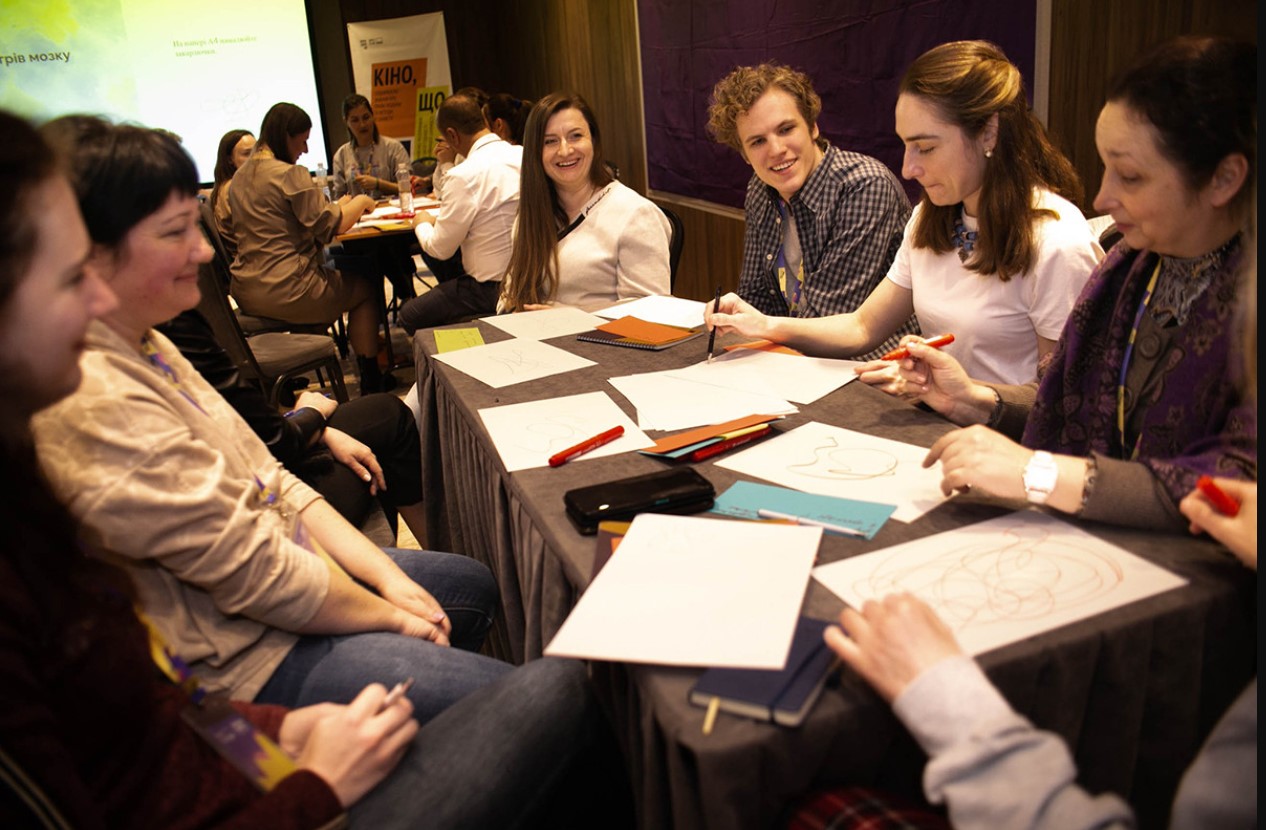
Training for film club moderators
- Which stories from this collection were the most memorable for you?
- I remember all 26 of them, as well as those not included in the collection. Here is one story about a local success, and another about a nationwide success. Both cases took place during the full-scale war.
In the village of Khoroshiv, Zhytomyr region, there is a charitable organization called “Nytka Ariadny” (Ariadne's Thread). Its head Halyna Minyaluk opened a Docudays UA film club there. People would gather, watch films, discuss them, and then talk about the problems of the village. Everyone was most concerned about the school road. During the two years of war, bushes have overgrown the sidewalks and part of the road, and someone dumped construction waste there. There were no markings, no signs, no pointers. Cars would be rushing along this road as children would be heading to school. The village council had no plans of repairing the road. After her training at the Advocacy School of the Film Club Network, Halyna Minyaluk gathered activists from the Khoroshiv community. Together they developed a plan to restore the road, made a financial estimate, and wrote a proposal to the village head, saying: we will do this work on our own, but we need funds from the village council for these materials and work. The village council supported their plan and estimates. And they succeeded! The bushes were cleared, the garbage removed, the sidewalks repaired, the markings painted, and the signs hung. They also taught children how to behave on the road. Halyna Minyaluk later said that the head of the village council liked the campaign so much that he suggested they repair other streets as well.
A more global advocacy story started back in 2021, in one of the institutions of the Probation Center. Lina Babych, then head of the institution, opened a Docudays UA film club and eventually noticed that documentaries helped her a lot in educational work with her clients - perpetrators with suspended sentences. She screened films about the fates of convicts in different countries and their return to normal life. Lina's clients willingly came to the screenings, discussed the films, and shared their plans for the future. With our help, Lina developed a methodology of the use of films at the Probation Center institution and its results and submitted it to the Ministry of Justice with a proposal to recommend it for the work of the Probation Center. Shortly after, the full-scale invasion began, the Ministry of Justice did not respond, and our team faced many new challenges and concerns. Only in 2023 did Tetiana Kichata, Deputy Director of the Probation Center of Ukraine, write to us that the proposal was very good and their team was ready to cooperate. We signed a Memorandum of Cooperation, and since then, 193 film clubs have been opened at the institutions of the Probation Center. The results are impressive: the film clubs of probation institutions now cooperate with our other film clubs, organize joint events, and invite the clients’ friends and parents to film screenings at their wards. The clients themselves are eager to attend libraries, museums, and NGOs that also host Docudays UA film clubs.
I can tell you a lot about the initiative of a Ternopil teacher Oksana Gil, which facilitated the use of documentary films to teach various subjects, from law to geography, physics, chemistry, and others. In Kremenchuk, Poltava region, Novoukrainka, Kirovohrad region, Ivano-Frankivsk, Chornomorsk, Odesa region, and many other cities and villages, projects for systemic support and integration of IDPs have been implemented on the initiative of the Docu/Club network leaders. Youth centers have been opened in some towns and villages, while in others, following the activists’ initiative, the authorities have introduced waste sorting. In Pokaliv, Zhytomyr region, activists managed to dismantle the monument to the “first communist” erected in the 1970s, and also formed and approved in the city council a plan to create a place of memory for the fallen modern heroes. Following their example, an active decommunization process has begun in many surrounding villages: community activists are removing all symbols of the Soviet era that fall under the scope of the Law on Decommunization.
- What issues are raised in today’s documentaries?
- Issues of identity. The problems of value “gaps,” both at the level of one family and at the level of the country and the world. And, of course, the war with all the hardships it entails.
At the 21st Docudays UA festival, which took place in early June, I was amazed by “Peaceful People,” a film by Oksana Karpovych, in which Russian soldiers tell their wives and mothers how they torture and kill Ukrainian civilians on our soil. The film made me think about who I can and cannot consider humans, and how to coexist with those who are inhuman.
I was also impressed by “Fragments of Ice” by Maryna Stoyanova about the conscious restoration of Ukrainian identity in a Russianized family. Svitlana Lishchynska's film “A Bit of a Stranger” is a very powerful story about four generations of Ukrainian women from the same family who, for the first time in their lives, are exploring the long process of destroying their national identity due to Russia's full-scale invasion. We will try to obtain the right to screen these films in our film clubs as soon as possible.
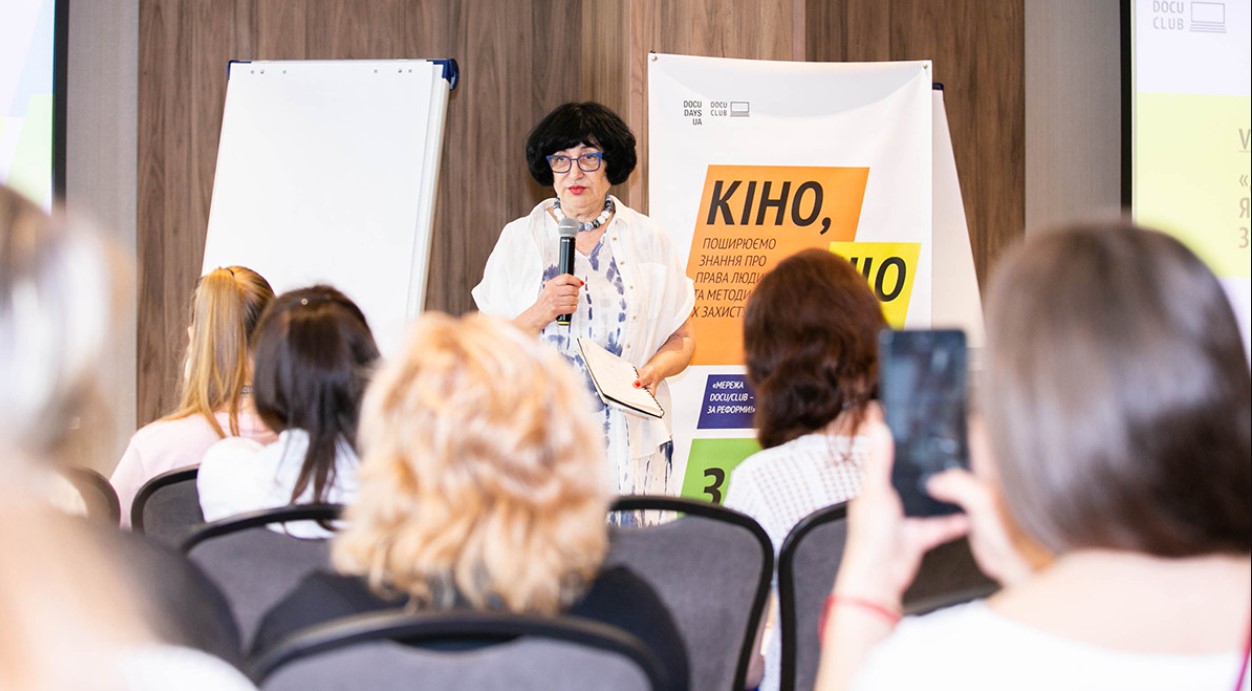 Training for film club moderators
Training for film club moderators
The value of our network lies also in the fact that it works as an alternative distribution system: film clubs extend the life of films for many years after they have been screened at festivals and in cinemas. For example, “The Language” by Serhiy Lysenko, produced in 2016, is still popular with film club audiences. It tells the story of activists who, after the Revolution of Dignity, took buses with Ukrainian books to the east and opened Ukrainian language courses there. It's a very touching and convincing film. In the last three years alone, it has been screened 201 times in film clubs. Thanks to this film, Ukrainian language courses were opened in cities and towns in Donbas and elsewhere. This year, the audience of a film club in Dnipro watched the film and decided they also need such a course, because there are many internally displaced people in the city who want to learn the language. The course has already opened.
Another eternal theme in documentaries, both old and new, is the protection of human and community rights. The film “Shut the Fck Up,” directed by Taisiia Kutuzova in 2019, is still popular in film clubs. It is about a 15-year-old activist, Serhiy Chaharov, who is fighting corruption and land takeover in his native village of Hatne near Kyiv. His main weapon is documents and journalistic text. He is threatened, advised not to interfere in “adult affairs,” and one night, an explosive is planted in his yard. After this film, people start asking questions to their deputies, demand reports, and become more active in interfering with council decisions.
- Which documentaries do you personally like the most?
- I have many favorite films. A lot of them. But if we are talking about a film that I have watched several times, it would be “Gwendolyn” by the Austrian director Ruth Kaserer. It's about a 65-year-old woman, a retired anthropologist who has three world titles in weightlifting. She weighs 52 kilograms and is battling salivary gland cancer. One of her arms is not quite able to move. Despite her illness, she trains to become a world champion again. And she succeeds! She also writes a book, organizes romantic parties with her husband, and dances with friends. She is already planning what to do after she finishes her book and completes her sports career. I fell in love with Gwendolyn, who is like a sister to me. In general, I really like films about people who, despite their age, live their lives to the fullest, with regard to their circumstances and challenges. They live here and now, fully enjoying every minute.
- Documentary film clubs have been active for 10 years now. What are you most proud of during this time?
- I'm proud of the Docu/Club Network, its perseverance and relevance. I am proud of the moderators, of what they do, and how they inspire people in their communities to change their lives for the better. They are lighthouses in their communities and guardians of high civilizational values in difficult times of global chaos. Most of all, I am proud of the management team of the Docu/Club Network. They are unbreakable people in love with the network in general and with each film club moderator in particular, professionals with an exaggerated sense of responsibility, generators of new ideas and projects, who are also very reliable, committed to human rights values, and always ready for new challenges and achievements.

Alla Tiutiunnyk at the conference for moderators
- What plans do you have for the future? What new things would you like to do in the nearest time?
- We want to increase the number of film clubs and develop an even wider understanding of the value of documentary films in society. In addition, on June 1, we launched an all-Ukrainian campaign to protect children from sexual abuse on the Internet. We have been studying this problem for several months. We were struck by the fact that Ukraine occupies the fifth place worldwide in terms of the quantity of content about sexual abuse of children spread on the Internet. The research shows that every 12th child in Ukraine has received an invitation to undress in front of a camera. A quarter of children in Ukraine have experienced sexual abuse on the Internet at least once. Half of these children did not tell their parents, teachers, or any other adult about the incident. Also, more than half of the children did not know anything about this threat. We want to join forces with educational organizations that are already working in this field, use the film clubs network to spread information among children, teachers, and parents, and teach them how to avoid this danger on the Internet.
Photo: Dmytro Shatsky
Main photo: Stas Kartashov
The development of the DOCU/CLUB Network is funded by the United States Agency for International Development (USAID), the Embassy of Sweden in Ukraine, the National Endowment for Democracy (NED) and Fondation de France.
The opinions, conclusions, or recommendations are those of the authors and compilers of this publication and do not necessarily reflect the views of the governments or charitable organizations of these countries. The authors and compilers are solely responsible for the content of this publication.
All news


